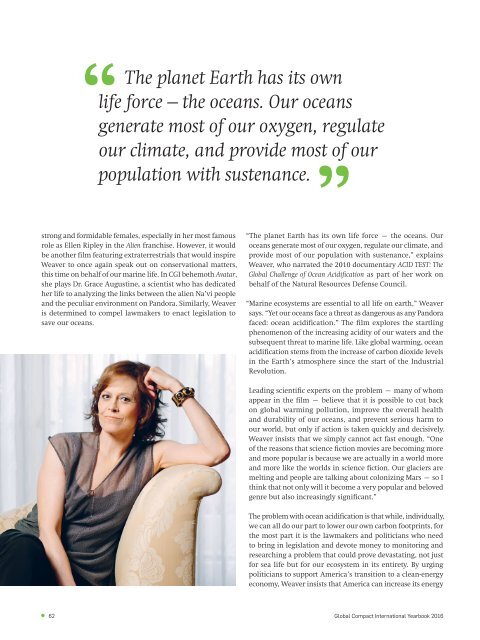Global Compact International Yearbook 2016
The Sustainable Development Goals are an ambitious agenda with 17 topics addressing the global challenges of our time. A key topic is innovation: Business must fit into planetary boundaries. This probably will not work with traditional business models. That is why we need new, fresh ideas. We need change, even when it happens in a rough, disruptive way. And the earlier the better. This is why the upcoming edition of the Global Compact International Yearbook, published in September 2016, has chosen sustainable innovation as the key topic. Also includes exclusive interviews with Angelina Jolie, Robert Redford and Sigourney Weaver. The Global Compact International Yearbook is with more than 500,000 readers one of the worlds leading CSR publications. Münster/New York 2016: 164 pages, paperback Publishing houses: macondo publishing/UN Publications Subscription (via UN Publications only): 30.00 USD (regular) 15.00 USD (reduced) ISBN13: 978-3-946284-01-7 / ISSN-Print: 2365-3396 / ISSN-Internet: 2365-340x
The Sustainable Development Goals are an ambitious agenda with 17 topics addressing the global challenges of our time. A key topic is innovation: Business must fit into planetary boundaries. This probably will not work with traditional business models. That is why we need new, fresh ideas. We need change, even when it happens in a rough, disruptive way. And the earlier the better. This is why the upcoming edition of the Global Compact International Yearbook, published in September 2016, has chosen sustainable innovation as the key topic.
Also includes exclusive interviews with Angelina Jolie, Robert Redford and Sigourney Weaver.
The Global Compact International Yearbook is with more than 500,000 readers one of the worlds leading CSR publications.
Münster/New York 2016: 164 pages, paperback
Publishing houses: macondo publishing/UN Publications
Subscription (via UN Publications only): 30.00 USD (regular) 15.00 USD (reduced)
ISBN13: 978-3-946284-01-7 / ISSN-Print: 2365-3396 / ISSN-Internet: 2365-340x
Create successful ePaper yourself
Turn your PDF publications into a flip-book with our unique Google optimized e-Paper software.
“<br />
The planet Earth has its own<br />
life force – the oceans. Our oceans<br />
generate most of our oxygen, regulate<br />
our climate, and provide most of our<br />
population with sustenance.<br />
strong and formidable females, especially in her most famous<br />
role as Ellen Ripley in the Alien franchise. However, it would<br />
be another film featuring extraterrestrials that would inspire<br />
Weaver to once again speak out on conservational matters,<br />
this time on behalf of our marine life. In CGI behemoth Avatar,<br />
she plays Dr. Grace Augustine, a scientist who has dedicated<br />
her life to analyzing the links between the alien Na’vi people<br />
and the peculiar environment on Pandora. Similarly, Weaver<br />
is determined to compel lawmakers to enact legislation to<br />
save our oceans.<br />
”<br />
“The planet Earth has its own life force – the oceans. Our<br />
oceans generate most of our oxygen, regulate our climate, and<br />
provide most of our population with sustenance,” explains<br />
Weaver, who narrated the 2010 documentary ACID TEST: The<br />
<strong>Global</strong> Challenge of Ocean Acidification as part of her work on<br />
behalf of the Natural Resources Defense Council.<br />
“Marine ecosystems are essential to all life on earth,” Weaver<br />
says. “Yet our oceans face a threat as dangerous as any Pandora<br />
faced: ocean acidification.” The film explores the startling<br />
phenomenon of the increasing acidity of our waters and the<br />
subsequent threat to marine life. Like global warming, ocean<br />
acidification stems from the increase of carbon dioxide levels<br />
in the Earth’s atmosphere since the start of the Industrial<br />
Revolution.<br />
Leading scientific experts on the problem – many of whom<br />
appear in the film – believe that it is possible to cut back<br />
on global warming pollution, improve the overall health<br />
and durability of our oceans, and prevent serious harm to<br />
our world, but only if action is taken quickly and decisively.<br />
Weaver insists that we simply cannot act fast enough. “One<br />
of the reasons that science fiction movies are becoming more<br />
and more popular is because we are actually in a world more<br />
and more like the worlds in science fiction. Our glaciers are<br />
melting and people are talking about colonizing Mars – so I<br />
think that not only will it become a very popular and beloved<br />
genre but also increasingly significant.”<br />
The problem with ocean acidification is that while, individually,<br />
we can all do our part to lower our own carbon footprints, for<br />
the most part it is the lawmakers and politicians who need<br />
to bring in legislation and devote money to monitoring and<br />
researching a problem that could prove devastating, not just<br />
for sea life but for our ecosystem in its entirety. By urging<br />
politicians to support America’s transition to a clean-energy<br />
economy, Weaver insists that America can increase its energy<br />
62<br />
<strong>Global</strong> <strong>Compact</strong> <strong>International</strong> <strong>Yearbook</strong> <strong>2016</strong>

















